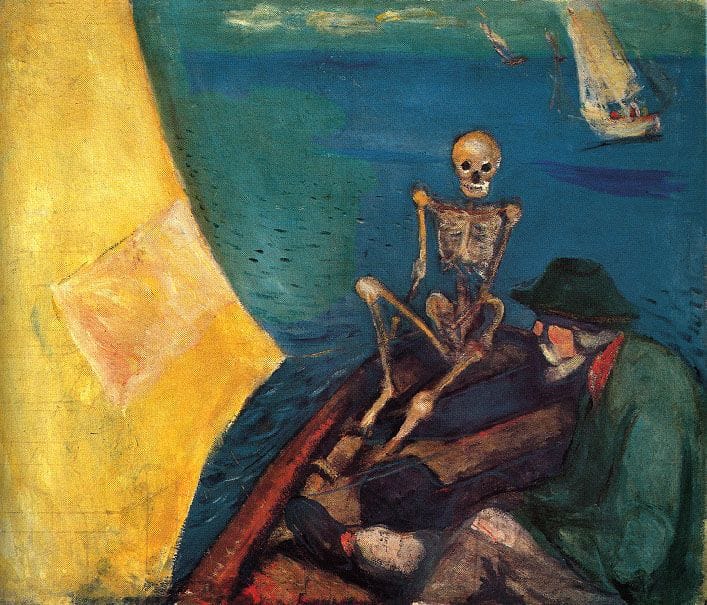The rich young man in Jesus' clinic
To be able to concretely love people, we must learn to partner with the mystery of change, to summon its appearance, come what may, and to diligently dance whichever conjuring ritual we happen to have stumbled upon ourselves.

Sometimes the smallest glance can break a person down, while others won’t change even as their lives are wracked by wave after wave of intense personal crisis – change is the most mysterious thing in the world, it seems to me. It’s constant and everywhere, but when and why it comes remains the inscrutable secret of God.
To truly be able to concretely love other people though, we must learn to partner with this mystery, to summon its appearance, come what may, and to diligently dance whichever conjuring ritual we happen to have stumbled upon ourselves.
However, we have to be careful here. Not everyone is ripe for change, and an ill-timed overdose of insight can be just as damaging (if not more so) than clinging to a transitional object or retreating into our symbolic identities.
This is why Jacques Lacan reminds us that all of the analyst’s interventions must be moderated by a “tact,” an intuitive judgment cultivated by practical experience which allows us to adjust our work to the tools and conditions at our disposal. Tact takes into account the way that the material we are working with responds to our intervention, listening to what the feedback is telling us about how the process is going.
Jesus of Nazareth also exercised this tact to make targeted interventions in the lives of those who came to him seeking guidance. I think especially of the “rich young ruler” in Matthew 19:16-22, where a young man approaches Jesus, asking him what he must do to receive eternal life. This young man claims that he has kept all of God’s commandments to this day, and he wants Jesus to tell him what he still lacks in order to attain eternal life.
This young man's words present the exoteric claim par excellence, ("I have done the thing, now where is my reward?") and confronts us the standpoint of the Obsessive who believes they have the Other successfully within their grasp to extract their desired enjoyment. What will Jesus say to this young man?
Upon hearing this bold self-assessment, Jesus decides to adjust his approach to meet the young man at a different level than he is expecting him to – Jesus says, “If you want to be perfect, go, sell what you have and give to the poor, and you will have treasure in heaven; and come, follow me,” (v.21) in response to which St. Matthew records “But when the young man heard that saying, he went away sorrowful, for he had great possessions.” (v.22)
Perhaps the young man expected Jesus to praise him with assurances or to provide him with some final secret step to attaining eternal bliss, but instead Jesus confronts him with his own desire in order to wake him up to the true state of his heart. In this way, I believe Jesus performs an act of true love.
We know that this young man did not perfectly keep God’s commandments (the nature of the Law makes this impossible), nor is Jesus teaching that the only thing that remained for this young man to do to attain eternal life was to give away all his possessions. Rather, this vignette demonstrates something much deeper about the life of faith – Jesus reveals the obstacle which our desires for identity and security can pose on the path of change, and how we can miss the offer of life right in front of us because we are clinging to dead objects.
Jesus chose the particular commandment of almsgiving not because of its inherent superiority in relation to other commands, but rather on account of what it would reveal about the operative structure of this young man’s identity. His sorrowful response is all the evidence we need to confirm that Jesus’ response was right on target.
Reading stories like this in the Gospels is like watching a master clinician at work with his patients, for Jesus grasps the depths and trickery of the human heart in such profound ways. Here too we find a model for how to sow the seeds of change in the hearts of others, fanning in them the flames of desire to seek out a cure for what ails them, or perhaps even to simply wake them up to the fact that they are indeed ailing.
This is always the first step towards healing – to become aware that one is sick. How then can we love others by helping them see how sick they are?
And how to do this in such a way that we do not accidentally pass them a disease which is worse than the first?
Every medicine is a poison, but a doctor must still aim to 'do no harm' – so too with a doctor of souls.
This was a modified excerpt from a chapter I'm working on for the PhilosophyPortal anthology on Lacan's Écrits. The piece will expand on the themes I began to explore earlier this year in the idea of transitional discourses and the passage from the exoteric to the esoteric. I also have a piece in the most recent PhilosophyPortal anthology on Hegel's Science of Logic, and I highly recommend picking up that book as well. I look forward when I have more news to share about this next anthology!
